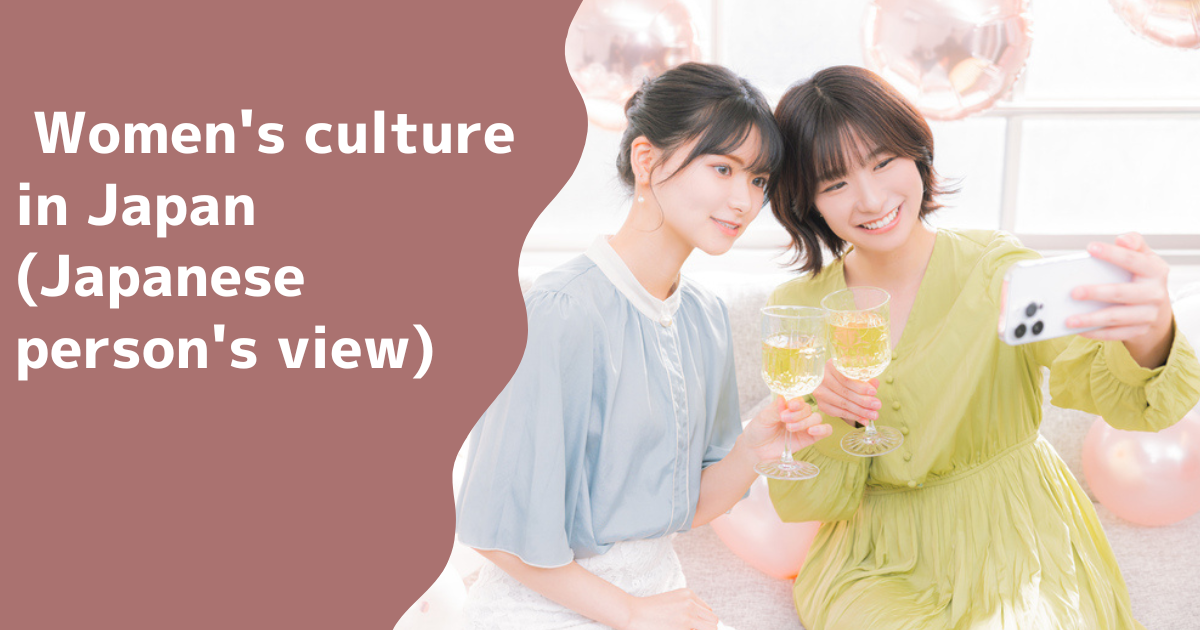If you have a chance to come to Japan, you might be wondering why Japanese ladies are rather quiet than other foreign ladies, they are hardworking at home and at work, and also you could be concerned if there is any social pressure on them.
Further, if you are a non-Japanese lady you may also wonder if there is any restriction on daily life or work in Japan.
In this article, I’d like to explain the following matters.
-Characteristic of Japanese ladies
-Hardworking Japanese ladies
-Working environment for Japanese ladies
After reading this article I hope you will understand overall Japanese ladies’ culture and how to get along with Japanese ladies and also understand this distinctive society as a lady.

Let me introduce myself. I am Hiro from Tokyo and I was born and raised here. I have a Japanese wife and she also gave me an opinion for writing this article.
Characteristic of Japanese ladies

There are distinctive characteristic tendencies of Japanese ladies which cannot be seen by other countries’ ladies and I’d like to introduce some of them as follows.
They don’t tell their opinions well
Japanese ladies tend not to tell their opinions well and they are rather understanding of other people’s suggestions, ideas, or opinions.
This is because of Japanese people’s tendency to a collectivistic culture (understanding situations is more important rather than expressing themselves in Japan).
Furthermore, from a long time ago, there have been Japanese traditional thoughts that a man should lead a woman and she should trust and follow him.
Of course, that traditional way of thinking is gradually disappearing but not telling much of their opinions is still considered positive among them.
Sensitive about their appearance
Japanese ladies are quite sensitive about their appearance and they usually make up and care about their hairstyle and body shape even when they go out to a supermarket near their home.
It is also part of etiquette that Japanese ladies make up when they work.
I met a Japanese lady when I was in New Zealand in 2018, who felt relieved when she worked in another country because she didn’t need to care about make-up or her outfit when she went out.
Often compare with other ladies
Japanese ladies often choose their clothes to buy not on their own preference but on the same group members’ opinions, or trends.
They are sensitive not to being odd people in their belonging group.
From non-Japanese people’s view, Japanese ladies’ outfits could be fashionable but lack individuality.
The above tendency reflects the Japanese collectivistic culture and they could wish to be accepted by a certain group or society rather than expressing their desire.
*Above characteristic is just a tendency and I am not telling all the ladies in Japan to have the same personality.
Hard-working Japanese ladies

Japanese ladies are usually hard-working engaging in housework, raising their kids and working.
Based on research by the ministry in Japan in 2016, if both husbands and wives are working and have kids (less than 6 years old), the average time of daily housework and childcare done by wives and husbands are as follows.
Housework:
186 min for wives
20 min for husbands
Childcare:
222 min for wives
48 min for husbands
In total, ladies are spending 608 min on housework and childcare daily on average, which is a punishing schedule for them.

If you are interested in Japanese housewives culture, please refer to the below link.
Why Japanese husbands don’t engage in housework and childcare
The above ratio shows that Japanese husbands are extremely lazy at home however long hours working culture also makes that environment.
Based on research by OECD in 2020, an international comparison of aged 15-64 male and female, Japanese man has the longest paid labour time which is 452 min (7 hours 32 min) per day on average.
It is around 2 hours longer than the average time among OECD countries.
That result shows that Japanese men are not possibly lazy only but don’t have enough time to do housework and childcare due to their hard work at companies.
Whereas, Japanese ladies paid labour time is 272 min (4 hours 32 min) which is 1 hour longer than the OECD average.
If we consider both unpaid work (housework and childcare) and paid work, men and women are both working extremely hard in Japan.
In that situation, it is quite difficult to improve the situation of the Japanese wife’s hard work.
The working environment for Japanese ladies

In the past, after getting married most Japanese ladies quit working and engage in housework and childcare.
Based on the poll done by the ministry in Japan, the percentage of housewives was 64% in 1980 and it significantly dropped since then.
Now the percentage of working wives is 69% in 2021 and the majority of ladies somehow continue working.
My wife works at a bank in Japan and she still continues working there thanks to the support of the company (e.g. temporary short-time work was allowed when our kid was little and the company allocate her to the nearest branch to our house.)
The ratio of female managers in Japan
The number of working wives are increasing recently, but what about the ratio of female managers in Japan?
Based on the research by ILO (International Labour Organization), the female manager ratio is 12% in 2018, whereas the global average percentage of female managers is 27.1%.
For example in my company’s Tokyo branch, there are only 2 ladies’ managers and the rest of the 13 managers are all male.
The situation is similar to other companies in Japan too.
Although the Japanese government is promoting more ladies to be managers and their target is 30% of female managers in 2020s, it seems quite difficult steps to go in the current environment of housework and childcare pressure towards ladies.
Conclusion
I introduced overall Japanese women’s culture in this article.
I hope you will understand overall Japanese ladies’ culture and how to get along with Japanese ladies and understand this distinctive society as a lady.
The situation of Japanese ladies is not optimistic but I hope it gradually improves in the 2020s led by the Japanese government.
Thank you for reading this article till the end.




コメント Comment